You’ve spent your whole pregnancy focused on growing new life inside of your body. You’ve supported yourself and your baby with food, hydration, rest, movement, appointments, blood work, ultrasounds and more. So why is it that once baby arrives, the person whose body did all that growing and stretching and accommodating gets a one-and-done follow up visit with their provider and is declared “good to go?” Birthing folks out there, hear this: your postpartum recovery needs your attention, too. So what are the key components of postpartum recovery and how can you best support your body and mind as it makes the transition to parenthood? Let’s break it down.
The most important components of postpartum recovery and healing are rest and nourishment.
First, we’ll discuss rest. Rest is critical to promote healing and bonding with your new baby. It will be more difficult to heal physically and bond with your baby emotionally if you have the physical stressors of moving around, staying busy, accomplishing tasks, etc. In some situations, this may be unavoidable. But when possible, plan to have support persons around so that you can rest as much as possible during those first few weeks. Did you know: in many cultures it is common to have at least a month of mandatory rest for the person who just gave birth? And I want to emphasize that rest is important no matter if you had an “easy” birth, “difficult” birth, vaginal or c-section. Every kind of birth requires rest and recovery afterwards. So what does this kind of rest really look like?
- Slow down your pace of life. Don’t have anything on the calendar besides those mandatory early doctor visits for you or baby.
- Aim for around two weeks of doing nothing- laying around, sitting around, staying in bed or on the couch.
- Have someone else prepare food/meals.
- If you have visitors, have them come to you (on the sofa or in your or baby’s bedroom). Don’t try to be a good host!
Physically resting and relaxing has a very specific purpose in the postpartum period. It promotes healing of the uterus, helps it return to its normal size, decreases your bleeding, allows for healing of tearing or stretching and generally gives the body time to recuperate from the major feat it just accomplished. Resting also allows for another important outcome: bonding with baby. The more of your energy and attention that is devoted solely to you, your baby and the bond between you, the better. Resting from other activities or responsibilities gives you time to get into a new rhythm with baby. It allows you to get used to a feeding routine. It enables you to get to know your baby’s signals and cues and different kinds of cries. As we’ll discuss more later, sleep deprivation can make concentration and normal logical thought extremely difficult. So the more mental and physical energy you leave yourself available for learning your baby and simply snuggling and loving on each other, the better you’ll be able to care for yourself and your new little one in those early days.
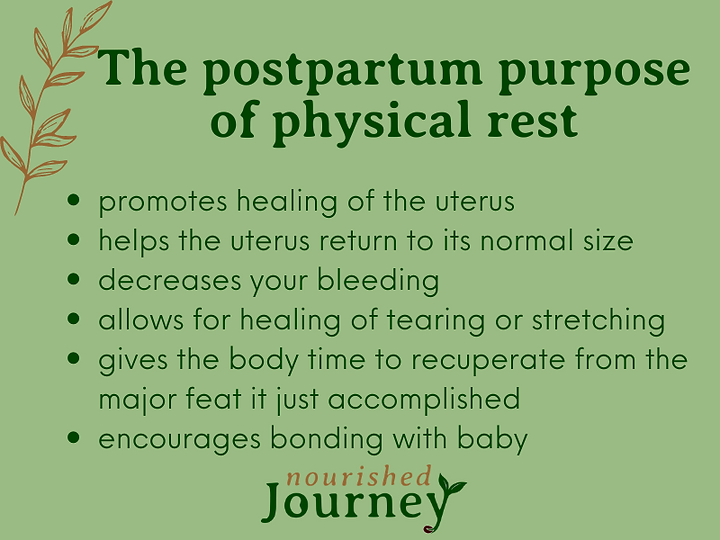
Another important component of your physical rest and healing is to intentionally take care “down there!” Here are my recommendations:
- Use a balm or spray like these by Earth Mama.
- Do a sitz bath or herbal soak in the tub.
- Make padsicles by pouring some fresh brewed herbal soak on a maxi pad and freezing it. Or you can buy some like these that don’t require a freezer at all. Ice where you are swollen, bruised, or stitched up to help decrease that swelling, inflammation and pain.
- Use the peri bottle as instructed at the hospital to decrease stinging when peeing and clean up after going to the bathroom. I love this upside down peri bottle. It may feel nice to be able to spray yourself clean instead of having to wipe with TP.
- Lastly, baby wipes aren’t just for babies! They can feel really lovely on sore and swollen parts.
The second essential component of postpartum recovery is nourishing your body.
The number one takeaway I want you to have regarding nutrition is this: postpartum is not a time to diet.
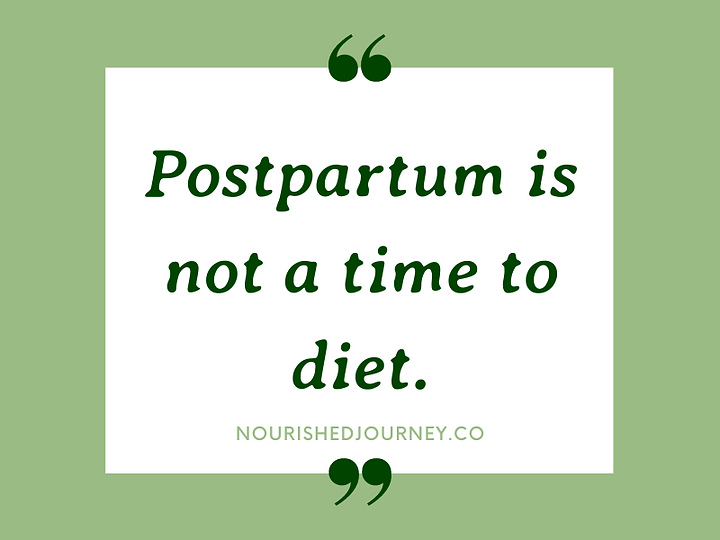
If you are familiar with the non-diet/ Intuitive Eating approach to health and nutrition, then you know I don’t believe any time of life is a time to diet. But I feel it’s especially important to emphasize to postpartum people because they are the targets of so much dieting, exercise and weight-loss advertising. Here are suggestions for how to approach food, nutrition and hydration to support postpartum recovery.
1. Eat regularly.
Eat often. Meals and snacks and more snacks. Have food available at any opportunity you may want something. I love keeping a basket of snacks stashed wherever you usually sit to breastfeed or give baby a bottle.
2. Make sure you get protein frequently throughout the day
Protein not only helps fill you up but it is also a key component of promoting healing internally. Remember, the placenta is a giant organ; where it was attached to your uterus, there is a big wound that needs to be healed. And if you had a c-section, that is a major surgery that also requires significant healing. There is no nutrient more important for wound healing than protein.
3. Get lots of fiber.
The bowel movements (BMs) during your first days/weeks/months postpartum can be difficult. You’ll want to do everything you can to make those easier on your body. Fiber helps them be easier to pass and helps keep you on a regular schedule so things are less likely to get backed up.
4. Focus on iron intake to account for all of the blood loss.
You should discuss your specific choice of postpartum vitamin or supplementation with your provider, but try to incorporate some high iron foods during postpartum. Beef, chicken, turkey, ham, lentils, beans and spinach are all good sources of iron.
5. Drink lots and lots of water.
Staying hydrated should be a top priority. It helps keep BMs regular, helps nutrients circulate throughout the body and provides the extra water needed for producing breast milk (if applicable). Consider getting yourself a giant water bottle that you can fill up just once or twice during the day to meet all your water needs.
6. Eat to satisfy your hunger.
You are expected to be pretty darn hungry after labor and birth- whether you had a vaginal birth or a Cesarean birth. Tune into your body’s hunger cues and eat until satisfied. Often you go for a long time without eating during labor, so your body may be extra hungry in the days afterward to encourage you to make up for that missed energy intake. Remind yourself that you are recovering from a major activity (or in some cases, surgery). Just like you would replenish your energy stores after completing a marathon, you need to help your body get nourishment and energy after the marathon of labor and birth. Lastly, if you are making milk, you need even more nutrients and energy to be adequately feeding you AND baby. I’ll say it again, postpartum is NOT a time to diet, limit portions, cut out food groups, or in any way restrict your intake. Eat to satisfy your hunger.
7. Go with your cravings.
Eating adequately to nourish your body is your priority. You may be craving carbs (they are the best source of immediate energy). You may be craving a milkshake or smoothie because it’s so easy to slurp down. You may be craving something warm and comforting like your favorite soup. Whatever your body is hinting that it wants, go with it. Trust yourself.
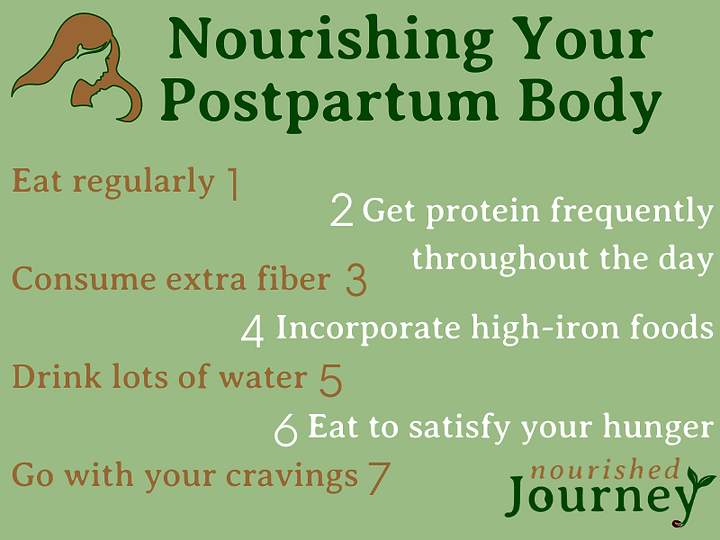
Another factor influencing your health and recovery in the postpartum period is sleep deprivation.
You may not be able to do anything about the inadequate sleep during those first weeks and months, but what you CAN do is set yourself up ahead of time to better handle the effects of sleep deprivation. When sleep deprived, your ability to make decisions and think rationally goes out the window, like being drunk or hungover. It’s likely going to be hard to make decisions about what to eat (or what to buy at the grocery store or what chores to tackle, etc). First, tell your partner or support person that this is what you are expecting to happen. Communicate so you’re both on the same page about them taking over not just physical tasks but also the mental task of making everyday decisions. They can be in charge of grocery shopping, deciding what to cook for meals, where to pick up take-out, coordinating meal drop offs by friends, communicating with people offering help about what tasks they can do for you, etc.
Plan ahead and plan to have help
Seeking help is something you can do both before and after baby arrives. Help can come from others and it can also come from preparations you made ahead of time. Here are some ideas:
- Consider writing down your staple grocery item order. What kinds of things do you like to have on-hand at all times? What kinds of ingredients do you need for go-to meals and snacks? Having this list ready-made to give to your partner or a friend offering to help will be so convenient. Don’t wait to write this list until the baby is born!
- Utilize a meal train. Someone in your community may offer to coordinate one for you, or you can easily set one up yourself. There are a few websites that you can use for free. You put in your details, food preferences, delivery address, dates for meals and then all you have to do is provide the link to anyone who is asking “When can I bring you a meal?” It takes the effort of coordination off of your shoulders, which is a huge relief. And remember, you don’t have to entertain the person who comes by with a meal. Your partner can interact with them or you can have a cooler on the front porch ready to receive the meal.
- If you have time at the end of your pregnancy, make some freezer meals or buy pre-made ones. Some of my favorite items from the frozen section of the grocery store are: burritos, lasagna/pastas, stir frys and pizza.
- Make a list of easy-to-prepare meals and snacks. Before the baby arrives, create a list of your favorite go-to meals that use 3-5 ingredients you always have on hand. For example: pasta and sauce, mac and cheese, quesadilla, rice and beans or yogurt and granola. Whoever is helping you out at home can use this list to put together meals and snacks for you without having to ask you or involve you. Again, see notes on sleep deprivation. You won’t want to be making these decisions.
- Write down the most common household chores that will need to be accomplished during your recovery time and provide any additional directions or details as needed. Where is the vacuum stored? Any special notes about your laundry? Where is your kitchen counter cleaning spray? When a friend comes over and offers to help, having this list prepared will be helpful to you and to them.
A few last notes on recovery:
Recovery is a marathon, not a sprint. Don’t expect your body to miraculously return to its pre-pregnancy state immediately. Recovery time is much longer than the six weeks that is often quoted by providers. Complete healing can take months to years, especially if you’re not getting the professional help you may need.
Find help / get help / accept help. This might mean help meeting physical needs, like questions about lasting effects of your birth or whether or not what you’re experiencing is normal. Or it could mean mental needs, like venting or processing all the major changes you’ve experienced. You might get help from friends, a partner, a counselor or therapist, a mom group, a doctor or OBGYN or a pelvic floor physical therapist. This last one can be immensely beneficial but is unfortunately rarely considered routine in postpartum healthcare. A pelvic floor PT can be a good appointment to make even if you don’t think anything is wrong. They can check if you are recovering correctly. The last thing you want is to be a year down the road and still leaking urine or feeling like things are just not normal down there. Seek help proactively and without reservations.
The postpartum phase can mean extreme vulnerability, exhaustion, physical pain as you heal, frustrations of feeding difficulties and many other types of stressors. Do what you can to make it as easy on your body and emotions as possible: allow for multiple weeks of complete resting, eat to nourish your body adequately and accept the help offered by loving friends, family and your partner.
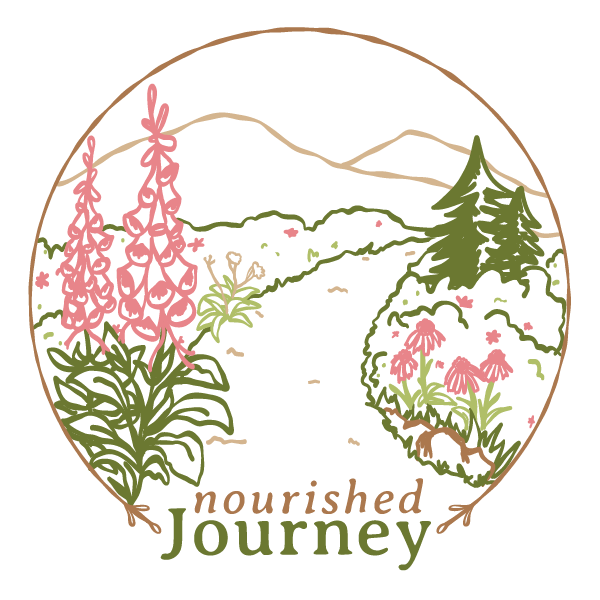
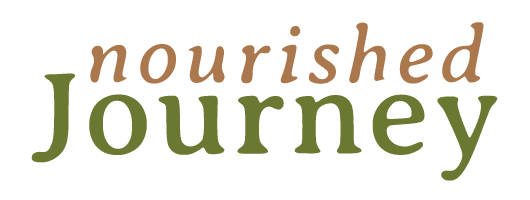


 Hi! I’m Emily.
Hi! I’m Emily.
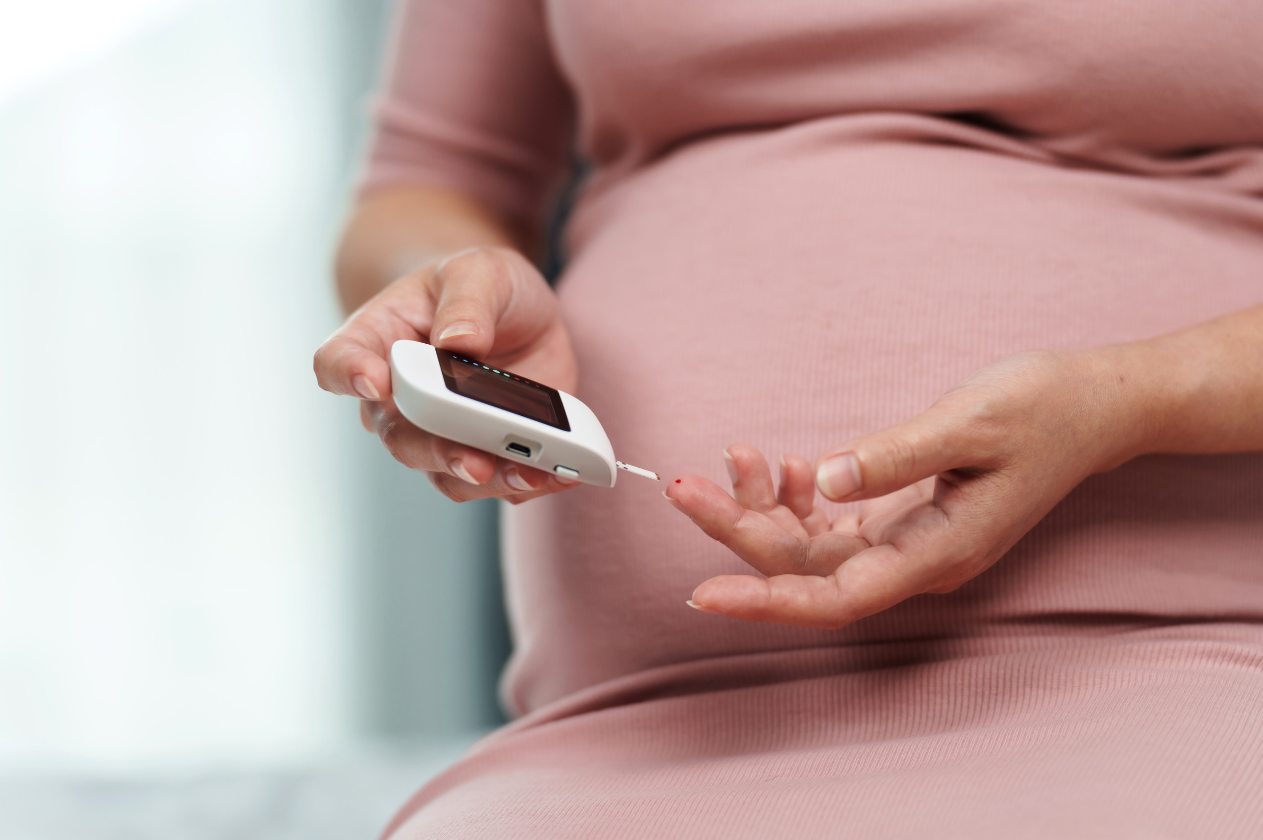
0 Comments